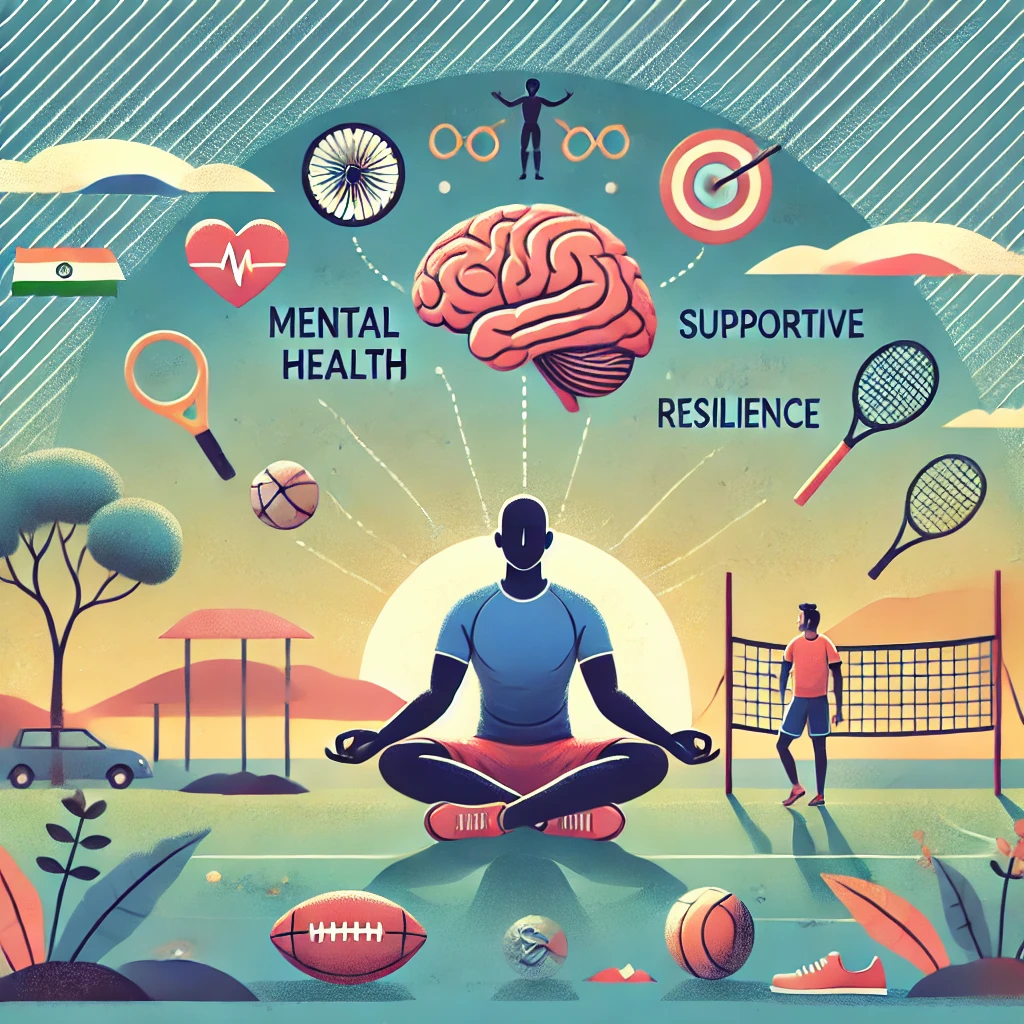Mental health has become a critical aspect of overall well-being for athletes, including those in India, where the focus has traditionally been more on physical performance. With the intense pressure to perform, represent the nation, and achieve excellence in a highly competitive environment, athletes often face significant psychological challenges. These pressures can result in stress, anxiety, burnout, and even depression. For many Indian athletes, the emphasis on physical fitness has often overshadowed the need for mental resilience, despite the two being closely interconnected.
A balanced approach that considers both mental and physical health is essential for athletes to reach their full potential. Mental health affects focus, decision-making, and the ability to cope with setbacks, all of which are critical in competitive sports. Athletes who prioritize their mental well-being are more likely to experience sustained success, as they can manage the emotional highs and lows that come with competing at a high level. As awareness grows, the Indian sports community is beginning to recognize the importance of mental health, but there is still a long way to go in addressing stigma and providing adequate support systems.
Common Mental Health Challenges Faced by Indian Athletes
Indian athletes, like their counterparts around the world, face a variety of mental health challenges that can impact their performance and overall well-being. These challenges are often intensified by cultural expectations, lack of awareness, and limited access to mental health resources.
Performance Pressure and High Expectations
One of the most significant challenges faced by Indian athletes is the immense pressure to perform well in national and international competitions. Representing a country of over a billion people, athletes are often burdened with high expectations from fans, media, and their own families. This pressure can lead to anxiety and stress, as the fear of failure becomes a constant companion. The focus on winning medals and accolades can overshadow the joy of playing the sport, making it difficult for athletes to maintain a healthy mindset.
Injuries and Their Psychological Impact
Injuries are a part of every athlete’s journey, but the psychological impact of being sidelined from the sport can be devastating. For Indian athletes, an injury can mean more than just physical pain; it can result in feelings of isolation, frustration, and helplessness. The recovery period can be mentally taxing, as athletes struggle with the uncertainty of whether they will be able to return to their previous level of performance. This can lead to depression or anxiety, especially when the injury affects their long-term career prospects.
Balancing Training and Personal Life
Athletes often face challenges in balancing their intense training schedules with personal and family life. The demands of rigorous training and frequent travel for competitions can strain relationships with family and friends, leading to feelings of loneliness. For many athletes in India, societal expectations around traditional roles can add to this pressure, particularly for female athletes, who may face additional scrutiny over their choice to pursue a sports career. This imbalance can result in stress and a sense of being misunderstood or unsupported.
Dealing with Public and Media Scrutiny
The rise of social media and 24/7 news coverage has made athletes more accessible to the public, but it has also increased their exposure to criticism. Negative comments, online trolling, and harsh media scrutiny can take a toll on an athlete’s self-esteem and mental well-being. Indian athletes often face public judgment, not just for their performance on the field but also for their personal lives and decisions. This constant scrutiny can lead to anxiety and self-doubt, making it challenging for athletes to stay focused on their goals.
These challenges highlight the need for a more compassionate approach to supporting the mental health of athletes in India. Addressing these issues is essential for creating an environment where athletes can thrive both mentally and physically.
The Role of Coaches and Support Systems in Mental Well-being
Coaches and support systems play a crucial role in maintaining the mental well-being of athletes. A positive and understanding coach can be a source of motivation, helping athletes navigate the pressures of competition and the challenges they face both on and off the field. In India, where the focus has often been on physical training, there is a growing recognition of the need for coaches to also support the mental aspects of an athlete’s development.
Creating a Supportive Training Environment
A supportive training environment is one where athletes feel valued, understood, and encouraged to express their concerns. Coaches who foster a sense of trust and open communication can help athletes manage stress and prevent burnout. This environment allows athletes to focus on their growth without the fear of judgment or criticism, making them more resilient in the face of setbacks.
Recognizing Signs of Stress and Burnout
Coaches and team managers are often the first to notice changes in an athlete’s behavior that could indicate mental distress. Recognizing signs of stress, such as decreased performance, lack of motivation, or irritability, is essential for early intervention. Providing access to mental health professionals or counselors can help address issues before they escalate, ensuring that athletes receive the support they need.
Encouraging Open Communication About Mental Health
Encouraging athletes to speak openly about their mental health struggles is key to breaking down the stigma that still surrounds these issues in India. Coaches who normalize conversations about mental well-being create a culture where seeking help is seen as a sign of strength rather than weakness. This shift in perspective can empower athletes to take control of their mental health, ultimately leading to better performance and a more fulfilling sports career.
Effective Strategies for Maintaining Mental Health
Maintaining good mental health is crucial for athletes to perform consistently and enjoy a long, successful career. Here are some strategies that can help athletes in India, and around the world, to manage stress, stay focused, and build resilience:
- Incorporating Mindfulness and Meditation Practices
Mindfulness and meditation are effective tools for managing stress and improving focus. Practices like deep breathing exercises, progressive muscle relaxation, and guided imagery can help athletes stay calm under pressure and maintain a positive mindset during competitions. - Regular Counseling or Therapy Sessions
Access to professional counseling can be a game-changer for athletes dealing with anxiety, depression, or burnout. Therapy provides a safe space to explore feelings, build coping strategies, and address underlying issues that may affect performance. Regular sessions can also help athletes develop a healthier approach to dealing with setbacks. - Setting Realistic Goals and Managing Expectations
Goal-setting is an important aspect of an athlete’s mental game. By setting achievable and realistic goals, athletes can maintain their motivation without becoming overwhelmed by unrealistic expectations. Breaking down larger objectives into smaller, manageable milestones can make progress feel more attainable. - Engaging in Hobbies and Relaxation Activities Outside of Sports
Having interests outside of sports can provide a sense of balance and relaxation for athletes. Whether it’s art, music, or spending time with family, these activities can offer a break from the intensity of training and competition, helping to reduce stress. - Building a Positive Support Network
Surrounding oneself with supportive family, friends, and teammates can make a significant difference in an athlete’s mental well-being. A positive support network offers encouragement during tough times and celebrates achievements, creating a sense of community that can help athletes stay grounded.
By adopting these strategies, athletes can better manage the pressures of competitive sports, allowing them to enjoy the journey as much as the victories.
Real-Life Stories: Indian Athletes Who Have Spoken About Mental Health
The conversation around mental health in sports has been enriched by the courage of Indian athletes who have shared their struggles publicly, breaking the silence and stigma associated with these issues.
Examples of Athletes Who Have Broken the Stigma
One prominent example is Dutee Chand, India’s ace sprinter, who has spoken about the challenges of managing public expectations and the stress of competing at international levels. Her openness about the emotional toll of high-stakes competitions has encouraged other athletes to share their stories and seek help when needed.
Cricketer Virat Kohli has also spoken candidly about his experiences with mental health, particularly the struggles with pressure and expectations that come with being a top athlete. By sharing his experiences, he has helped normalize the idea that mental health struggles are not a sign of weakness but a part of the human experience.
How Their Experiences Have Influenced Others
These stories have had a ripple effect, inspiring more athletes to prioritize their mental well-being and fostering a culture of openness in Indian sports. Their willingness to address the issue publicly has also helped bring more attention to the need for mental health resources in sports, prompting sports organizations to take action.
Through their bravery, these athletes have contributed to a growing awareness that mental health is as important as physical health, paving the way for a more supportive sports environment in India.
The Future of Mental Health Awareness in Indian Sports
The future of mental health awareness in Indian sports is promising, with a growing recognition of its importance among athletes, coaches, and sports organizations. As conversations around mental well-being become more common, the stigma surrounding mental health issues is gradually diminishing. This shift is creating a more inclusive environment where athletes feel comfortable seeking help without fear of judgment.
Investments in mental health resources, such as hiring sports psychologists and offering regular counseling services, are becoming more prevalent in professional sports teams and academies. This change is crucial for providing athletes with the tools they need to cope with the pressures of competition. Schools and sports federations are also starting to integrate mental health education into their programs, emphasizing the importance of a balanced approach to training.
Looking ahead, the continued collaboration between mental health professionals and sports communities will play a vital role in ensuring that Indian athletes have the support they need to thrive. By prioritizing mental health, India can nurture a generation of athletes who are not only physically strong but also mentally resilient, capable of achieving their full potential on the global stage.



